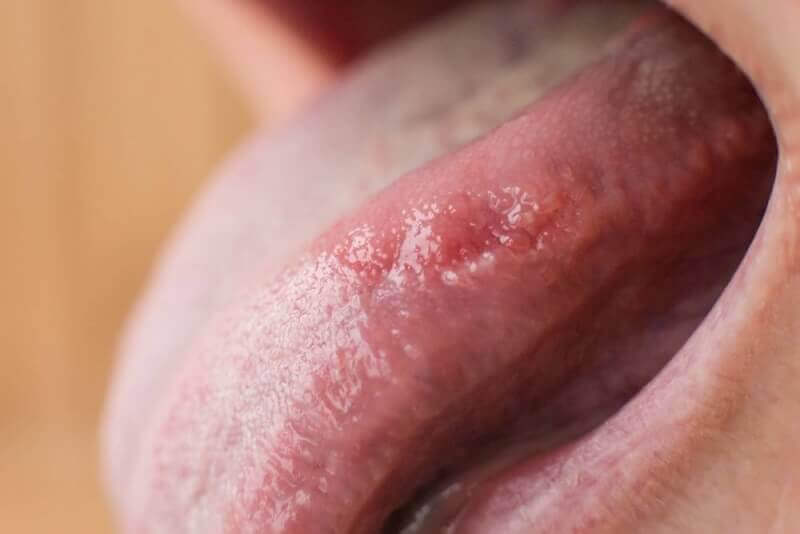What is Tongue Cancer?
Tongue cancer, a type of cancer that starts in the cells of the tongue, can also occur as a metastasis of various cancers. The treatment of tongue cancer, which usually starts in the squamous cells covering the upper surface of the tongue, is influenced by the affected tongue tissues and the prognosis.
If cancerous cells are seen in the front ⅔ of the tongue, it is classified as oral cancer. Cancers located in the pharyngeal part of the tongue are known as oropharyngeal cancers.
Types of Tongue Cancer
The most common type of tongue cancer is squamous cell carcinoma. These cells are found in areas including the tongue, mouth, nose, larynx, throat lining, and thyroid. Cancer that starts in these cells is called squamous cell carcinoma.
Squamous Cell (Epidermoid) Carcinoma
This is not only the most common type of tongue cancer but also the most common type of head and neck cancers. It occurs in the epithelial layer on the surface of the tongue.
Mucoepidermoid Carcinoma
This type of cancer occurs in the microscopic salivary glands within the epithelial tissue on the surface of the tongue. It can also be found in other organs in the head and neck area, as well as in the submandibular, parotid, and sublingual salivary glands.
Adenoid Cystic Carcinoma
This cancer is found in areas where mucoepidermoid carcinoma occurs, usually presenting with swelling as a symptom.
Symptoms of Tongue Cancer
Symptoms of tongue cancer include:
- Ear pain (rarely)
- Unexplained bleeding of the tongue
- Lump in the neck
- Difficulty moving the tongue
- Difficulty speaking
- Pain on the tongue
- Burning sensation on the tongue
- Pain while swallowing
- Painful ulcer or lump on the tongue
- Persistent sore throat
- Persistent red or white sore on the tongue
- Hardening of the tongue tissue
- Bad breath
- Difficulty opening the mouth
- Enlarged glands in the neck
- Mass formation in the head and neck region
- Unexplained weight loss
- Change in voice
Numbness in the tongue and mouth area
What are the early symptoms of tongue cancer?
Early symptoms of tongue cancer include:
- Pain and swelling in the upper or lower part of the tongue, causing discomfort while swallowing and speaking
- Red or white patches on the surface or edges of the tongue
- Ulcers on the tongue that do not heal for a long time
Causes of Tongue Cancer
The causes of many head and neck cancers are unknown. However, there are several risk factors that increase the risk of tongue cancer, similar to other cancers. These include:
- Smoking
- Regular and excessive alcohol consumption
- Infection caused by human papillomavirus (HPV)
HPV is a viral infection that affects the inside of the body and the skin. Most patients do not realize they have contracted this virus, as it usually heals on its own. While HPV generally has minimal effects on human health, it can cause tongue cancer in some individuals.
Tongue cancer is twice as common in men as in women. The most common age is 40 and above. African-American men are at the highest risk.
Another cause of tongue cancer is poor oral hygiene and dental problems. Ill-fitting dentures that do not fit properly can cause mucosal erosion over time, creating a risk factor.
How is Tongue Cancer Diagnosed?
To diagnose tongue cancer, a physical examination is first performed. This examination checks the patient's mouth and throat, as well as any swelling in the lymph nodes.
Biopsy
The only way to confirm a diagnosis of tongue cancer is to take a biopsy sample. The sample is examined under a microscope to detect cancer cells.
Examination Under Anesthesia
In some patients, imaging studies are performed under general anesthesia using a panendoscope to examine the throat. A biopsy sample may also be taken at this stage.
Nasendoscopy
An endoscope is passed through the nose to examine the mouth, back of the mouth, and larynx. This procedure is uncomfortable, so the throat area is numbed locally.
Other Diagnostic Methods
- MRI
- CT Scan
- PET CT Scan
- Blood tests
- Dental check
- Ultrasound scan
Stages of Tongue Cancer
As with other types of cancer, the stage of cancer is crucial for planning treatment. The TNM staging system is used for tongue cancer.
Stage 0
This stage is also known as carcinoma in situ. It indicates the presence of abnormal cells inside the lips or oral cavity that have the potential to become cancerous.
Stage 1
At the earliest stage of cancer, stage 1, the tumor is smaller than 2 centimeters and has not spread to the lymph nodes.
Stage 2
In stage 2 of tongue cancer, the tumor is between 2 and 4 centimeters. At this stage, cancer cells have not yet reached the lymph nodes.
Stage 3
In stage 3 of tongue cancer, the tumor is larger than 4 centimeters, and cancer cells are found in the lymph nodes in the neck.
Stage 4
Stage 4 is the most advanced stage of tongue cancer. At this stage, the tumor can be of any size and may spread to the following tissues:
- Jaw or other parts of the oral cavity
- Lymph node on the same side as the tumor
- Lungs
Tongue cancer can be diagnosed at stage 4. Stage 4 may also be seen due to recurrent tongue cancers.
Treatment of Tongue Cancer
The treatment of tongue cancer varies depending on the general health condition of the patients, the location of the cancer, and the stage of the cancer. Surgery, chemotherapy, and radiotherapy are used in the treatment of tongue cancer.
Surgery
Surgery is the only treatment method for early-stage tongue cancers. These surgeries are usually applied to cancers located in the front part of the tongue, as it is very difficult to diagnose cancers located in the back part of the tongue at an early stage. Patients operated on at this stage do not experience speech and swallowing disorders. Only minor cosmetic scars remain.
In cases of surgery for advanced-stage tongue cancers, patients' speech and swallowing abilities are also affected. If cancer has spread to the lymph nodes, these lymph nodes must also be removed. Reconstructive techniques are then applied to patients with speech and swallowing problems to resolve these issues.
Summary of Surgery
Duration of Surgery: 2 -6 hours
Type of Anesthesia: General
Hospital Stay Duration: 2-7 Days
Return to Work Duration: 2-8 Weeks
Radiation Therapy
Intensity-modulated radiation therapy and radiation therapy are applied to stop the growth and multiplication of cancer cells. Additionally, radiotherapy helps eliminate cancer cells and shrink tumors. Intensity-modulated radiotherapy causes fewer side effects compared to conventional radiotherapy. Radiotherapy is usually applied in 5 or 6-week cycles.
Chemotherapy
Chemotherapy is prescribed for three different reasons. The first reason is its use along with radiotherapy as an alternative to surgical procedures. The second reason is to kill any remaining cancerous cells after surgery. The final reason is to slow down cancer and reduce its symptoms in untreatable types of cancer.
Post-Surgery Care for Tongue Cancer
After tongue cancer surgeries, patients need to pay attention to several points to shorten their recovery period and make it more comfortable. These include:
Pain
Although there is significant individual variability in pain perception, considerable pain is present after tongue root surgeries. Therefore, narcotic painkillers are given to patients after surgery. Pain should not be allowed to become unbearable before taking medication. Pain typically continues for at least 7-14 days after surgery. However, it should improve by the second week post-surgery. If pain persists after the medication is finished, patients should contact their doctor.
Diet
Due to severe pain and difficulty swallowing, patients follow a liquid and soft diet for the first few days after surgery. They should ensure they are getting enough fluids during this period. Normal eating should be tolerated within 14 days post-surgery. Patients should avoid hard and dry foods like nuts, as these can cause pain and bleeding.
Physical Activity
Although there is a risk of blood clots after surgery, patients should avoid strenuous activities as they may increase the risk of severe bleeding. Instead, slow-paced short walks can help activate the circulatory system.
Bleeding
Patients may experience minor bleeding episodes after surgery. If bleeding does not stop or the amount of blood increases, they should go to the emergency room.
Sleeping Position
After surgery, patients should sleep with their head elevated 30-45 degrees to reduce swelling and improve breathing.
Speech Recovery After Tongue Cancer Surgery
The ability to speak after tongue cancer surgery varies depending on how much of the tongue was removed. Patients with partial removal can produce most sounds and words. However, if a total glossectomy is performed, patients will need to use paper, pen, or technological devices to communicate. Speech therapy is necessary for patients after tongue cancer surgeries. These therapies significantly improve the clarity of speech. Patients who have undergone partial glossectomy can be understood up to 24% before therapy and up to 46% after therapy. Patients who have undergone total glossectomy can be understood up to 8% before therapy and up to 42% after therapy.
Nutrition for Tongue Cancer
A healthy and nutritious diet is extremely important for cancer patients. The better they eat, the better their bodies can fight. The vitamins and minerals they consume can increase their strength and energy levels. Good nutrition also helps fight infections and repair damaged cells. Eating and drinking can be very challenging for tongue cancer patients. Generally, patients are advised to do their best to eat throughout the day. Making a few small changes to their diet can make mealtime more enjoyable.
Patients can make eating easier by following these tips:
- Patients should eat whenever they feel good, regardless of the time of day.
- Focus on small portions at traditional meal times.
- It is recommended to choose cold foods over hot foods.
- If the smell of cooking in the kitchen causes nausea, consider ordering food from outside.
- If metal or silver utensils have an unpleasant taste, use disposable or plastic utensils.
Patients should also pay attention to their fluid intake. Here are some tips to increase fluid consumption throughout the day:
- Keep water, juice, soup, ice cream, tea, and milk in the refrigerator.
- Sip fluids frequently throughout the day.
- Prepare fruit or vegetable juices in a blender.
- Suck on ice chips.
To improve their eating and gain extra calories, patients can follow these tips:
- Focus on soft, moist foods or foods cooked with sauces and fats.
- Keep quick and easy snacks like oatmeal, applesauce, eggs, frozen yogurt, cheese, crackers, nuts, and nut butter on hand.
- Consume non-acidic fruits and vegetables like melon, watermelon, spinach, and carrots.
- Limit red meat consumption and replace it with poultry and fish.
- Avoid sugar and processed foods.








